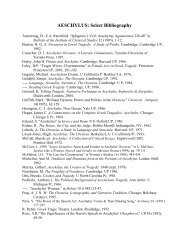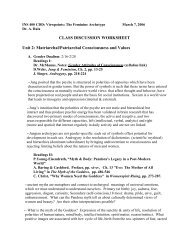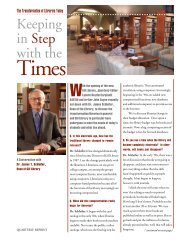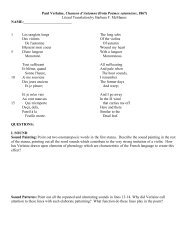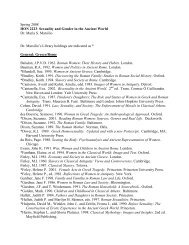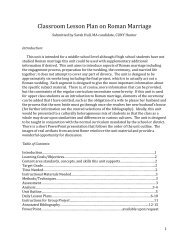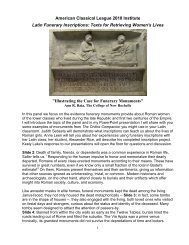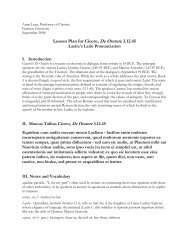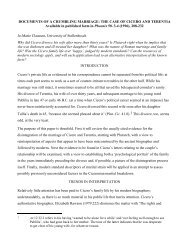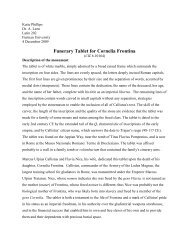Atalanta E.indd
Atalanta E.indd
Atalanta E.indd
- No tags were found...
Create successful ePaper yourself
Turn your PDF publications into a flip-book with our unique Google optimized e-Paper software.
661. morata est – note who is thesubject of this exclamatorysentence.662. diu – translate with spectatos.663. Note what words go together. Agolden line with adjectives onone side, nouns on the otherand the verb between.664. tribus - looks strange, but checkthe vocabulary.666. cupidine – the name of Cupid,but here the abstraction ofdesire. What case and reason?667. Note the arrangement of words.What is buried in the middleof the line?669. The arrangement of words inthis line is particularlyelaborate and has alliterationas well.Hippomenes passes <strong>Atalanta</strong> -Johann Wilhelm Baur Edition, 1659671. I believe the case and reason of iactu is the same as cupidine in 666. What does that make it?673. ades – present imperative of adsum, an alternate form for adesto. This form is used in prayers, which iswhat we have here.674. quo introduces a purpose clause because there is a comparative in the clause.675. ab obliquo – consider this an abl. manner.676. an – as so often: whether or not, introducing an indirect question.677. tollere, sublato – from the same verb – check the vocabulary. What’s the case and reason for malo?678. There is an understood object of inpedi(v)i of <strong>Atalanta</strong> in the accusative.680. The narrator of the story, Venus, now turns to the addressee, her beloved Adonis. Note that the cuiclauses are relative clauses of characteristic that go with digna . . . fui.682. immemor modifies an understood Hippomenes.683. subitam - note that it is an adjective here..684. contemptu - an ablative of cause with the verb (participle)showing the scorn thatHippomenes and <strong>Atalanta</strong>displayed to Venus by notpaying her honor. The neclause is purpose, explainingcaveo in the next line. Takefuturis as a dative of agentwith the passive periphrastic,with hominibus understood.685. exemplo - almost an ablative ofmeans. Note that with mequeipsa, which runs togetherwith the elision, Venusemphasizes that she isengaged in the action. Notethat ambos refers to bothHippomenes and <strong>Atalanta</strong>.created by Donald Connor<strong>Atalanta</strong> and Hippomenes - Guido Reni, 1672
O quotiens, cum iam posset transire, morata estspectatosque diu vultus invita reliquit!Aridus e lasso veniebat anhelitus ore,metaque erat longe: tum denique de tribus unumfetibus arboreis proles Neptunia misit. 665Obstipuit virgo nitidique cupidine pomideclinat cursus aurumque volubile tollit;praeterit Hippomenes: resonant spectacula plausu.Illa moram celeri cessataque tempora cursucorrigit atque iterum iuvenem post terga relinquit: 670et rursus pomi iactu remorata secundiconsequitur transitque virum. Pars ultima cursusrestabat; “Nunc” inquit “ades, dea muneris auctor!”inque latus campi, quo tardius illa rediret,iecit ab obliquo nitidum iuvenaliter aurum. 675An peteret, virgo visa est dubitare: coegitollere et adieci sublato pondera maloinpediique oneris pariter gravitate moraque,neve meus sermo cursu sit tardior ipso,praeterita est virgo: duxit sua praemia victor. 680“Dignane, cui grates ageret, cui turis honoremferret, Adoni, fui? Nec grates inmemor egit,nec mihi tura dedit. Subitam convertor in iram,contemptuque dolens, ne sim spernenda futuris,exemplo caveo meque ipsa exhortor in ambos: 685661. quotiens (adv.) - how often, as oftentranseo, transire, transii, transitum - go across; cross over,passmoror (1) - delay*662. specto (1) - see, gaze atinvitus, a, um - unwilling*663. aridus, a, um - dry, aridlassus, a, um - wearyanhelitus, us - breath664. meta, ae - turning point, goaldenique (adv.) - finally*tres, trium - three665. fetus, us (m.) - offspring; fruit*arboreus, a, um - of a tree; arborealproles, prolis (f.) - offspring*666. nitidus, a, um - shining667. declino (1) - turn asidevolubilis, e - rolling668. praetereo, praeterire, praeterii, praeteritus - go by, passbyresono (1) - reecho (Eng. resonate)spectaculum, i - spectator’s seat; grandstandplausus, us (m.) - applause669. cesso (1) - hang back, lagcursus, us - running670. corrigo, corrigere, correxi, correctus - correct; remedy;make up foriterum (adv.) - again*671. rursus (adv.) - again*iactus, us (m.) - throw, tossremoror (1) - delay (again)672. consequor, consequi, consecutus - followtranseo, transire, transii - pass673. resto, restare, restiti - stand firm; remain, be leftmunus, muneris (n.) - gift, favor; duty*auctor, auctoris (m.) - author, creator*674. latus, lateris (n.) - side* (Eng. lateral)tardus, a, um - late (Note the form used here; think)675. obliquus, a, um - sidelongiuvenaliter (adv.) - in a youthful manner676. cogo, cogere, coegi, coactus - force, compel* (con/ago)677. tollo, tollere, sustuli, sublatus - raise, lift*adicio, adicere, adieci, adiectus - add, throw topondus, ponderis (n.) - weight (Eng. ponderous, ponder)malum, i - apple678. inpedio, inpedire, inpedivi, inpeditus - impede, hindergravitas, gravitatis (f.) - weight679. neve (conj.) - and lestsermo, sermonis (f.) - speech681. tus, turis (n.) - incense, frankincense682. immemor, immemoris - unmindful, forgetful682. subitus, a, um - sudden683. contemptus, us - scorn, contempt685. caveo, cavere, cavi, cautum - be on one’s guardcreated by Donald Connor



